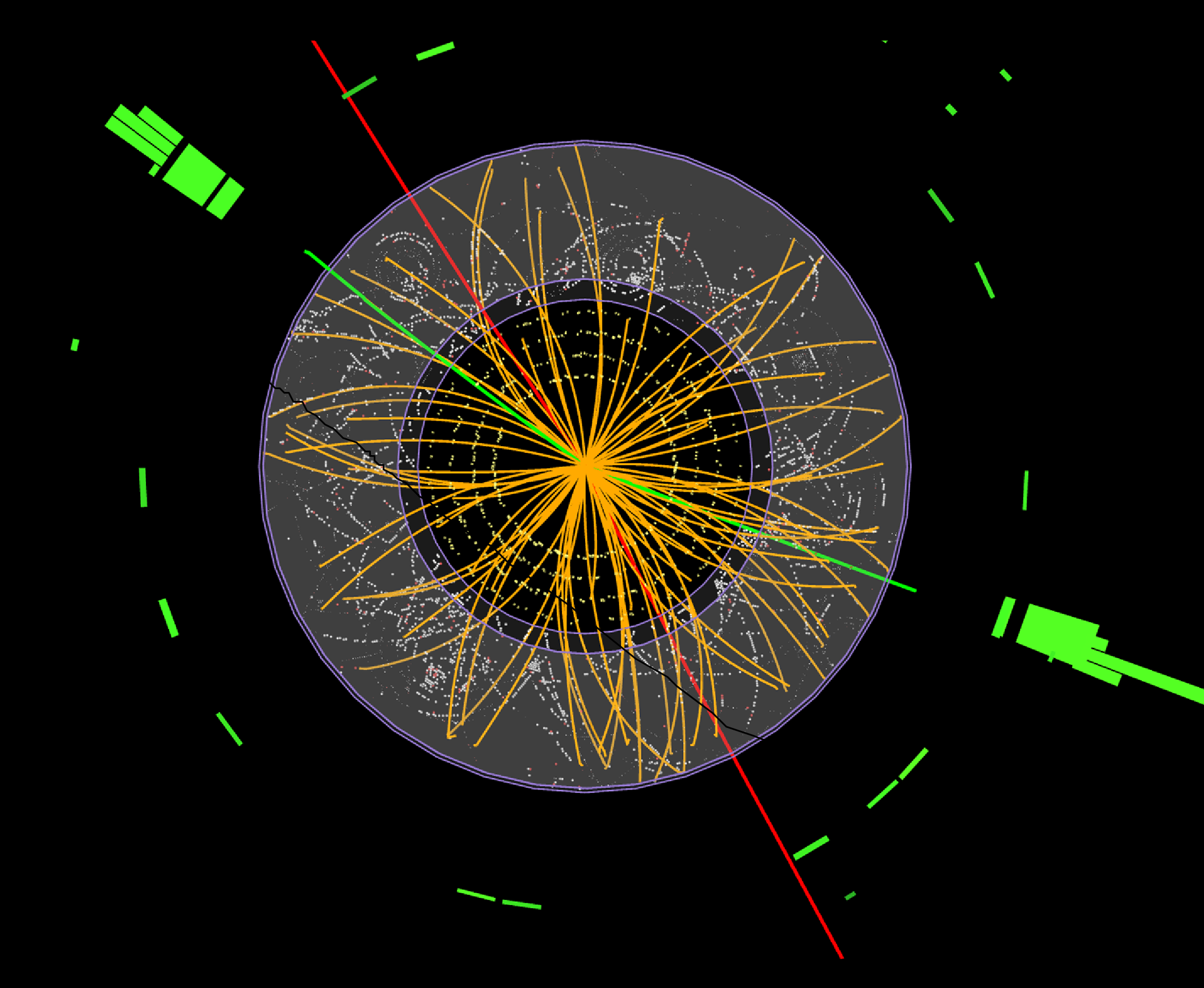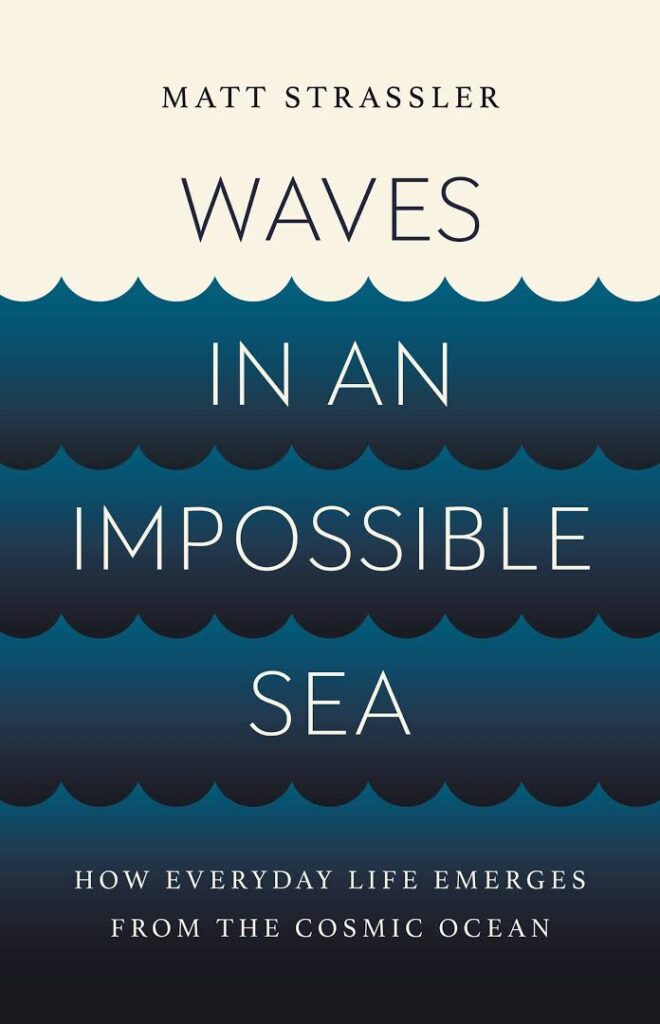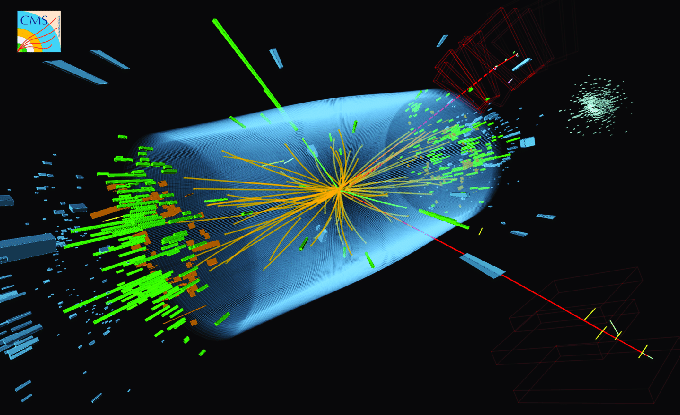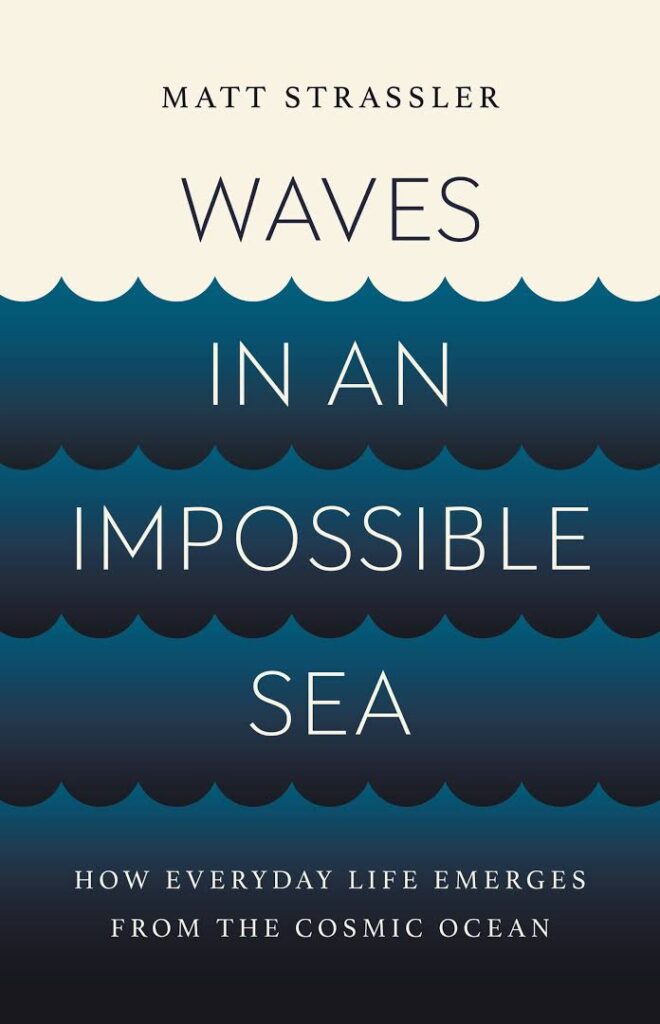July 4th will never be the same. As a child growing up in the United States, it meant flags, humidity, Sousa marches, democracy, and fireworks. Now it means something else: Switzerland, laboratories, technical wizardry, Higgs particles and — fireworks!
Yes, this picture is a representation of the data taken by the ATLAS experiment during a 2012 proton-proton collision at the Large Hadron Collider [LHC], in which (probably) a Higgs particle was created and swiftly decayed to (i.e. was transformed into) a muon, an antimuon, an electron and an anti-electron [“positron”]. Also flying about are many proton-like particles, called hadrons, the debris always seen in a proton-proton collision. Boom! (Admittedly a very quiet boom!)
2012 was a remarkable year that we’ll never forget, and its July 4th, when the Higgs particle’s discovery was announced, was unique. [And if you’re still confused about what the excitement is all about, or want to learn more, click here for some of my writing and speaking about it all.]
But as we wait for the LHC to start running again in 2015, analysis of the 2011-2012 data continues. People are working very hard, even on July 4th :-), and the possibility of other discoveries in that data is real! So stay tuned as more results emerge over the summer and fall and into 2014.





8 Responses
Hey Matt,
First of all, I really want to say thanks for all your work that we get to enjoy via your blog.
Secondly, and slightly off topic, but I would like to know what a human eye woud see at the collsion point assuming the detector equipment were somehow magically turned completely transparent? Would it look like a continuous firework going off? Like a sparkler perhaps? I hope this is a valid question!
Thanks
Steve
Matt: “July 4th will never be the same. As a child growing up in the United States, it meant flags, humidity, Sousa marches, democracy, and fireworks. Now it means something else: Switzerland, laboratories, technical wizardry, Higgs particles and — fireworks!”
No! July 4th will always be the same for me, fireworks for celebrating the American independence. As always, I had a big firework show in the backyard with a big BBQ party. Every firecracker went up to heaven with a loud-bang.
On the other hand, seemingly, “all” Higgs-firecrackers went dud on its first anniversary. It is rightfully so for two simple reasons.
1. A small reason —- no data of any kind is supporting a Higgs-firecracker. On July 4th, 2012, ATLAS along can claim the discovery of a new boson with a mass about 125 Gev. Yet, ATLAS has no additional data for the golden channels to support that that new boson is a Higgs of any kind thus far (on July 4th, 2013).
CMS did the same discovery claim on that same day. But, its March 2013 data showed that its discovery claim was sort of a mistake. Instead of withdrawing its discovery claim, CMS released some data on the golden channels and claimed that the new boson is a Higgs of some sort.
There is a major problem for CMS claim, its great data is written in statistics equation, similar to the story below.
Apple boy: $10 for { [1 (+/-) 1] Apple}
Grandmother: Hi, boy, here is a $10 bill.
Apple boy: Thanks grandmother.
Grandmother: Where is my Apple?
Apply boy: What Apple? There is no Apple (1 – 1 = 0 Apple).
Grandmother: How about the (1 + 1 = 2 Apple)?
Apple boy: Hi, grandmother, you never heard about the “error-bar” which happens only on the “for sale day”, buy-one-get-one-free, and it happens only every zillion years.
Every statistics equation has two parts, the measurement (the body) and the error-bar (the tail). When the tail swallows the body, that equation is simply non-sense (although might still have some useful info for physicists). Samuel Ting did not show the grandmother (the public) any number which has a tail bigger than the body in his AMS-02 presentation. But, most of released CMS golden channels data are the 0-Apple type, which will of course went dud.
2. The big reason —- there are two “solid” facts (not Apple-equations) known.
a. Litmus test for the final physics is now fully developed and widely known. One of the tests is the derivation of “Alpha”, which is absolutely not an Apple-equation. No grandmother will be confused by the calculation of Alpha. The answer is simply “right” or “wrong”.
b. Peter Woit wrote, “… since the story of the last thirty years is not one of evidence for string [M-] theory unification accumulating, but the opposite: the more we learn about string [M-] theory, the less likely it seems that it can predict anything. … String [M-] theory unification [getting the Standard Model out of it] is an idea now discredited in the scientific community, … “
Yet, the G-string can easily reproduce all the 48 SM particles, and it is now available at Vixra.org (http://blog.vixra.org/2013/05/16/why-i-still-like-string-theory/#comment-32550 ). With this, the SM is now having a theoretical foundation, and this is easily understood by the grandmother, no Apple-trick.
Yet, these two solid facts point out that Higgs mechanism is simply fairy-tale. Thus, how can Higgs-firecracker not go dud on this special July 4th?
Reblogged this on Gbenedio Akpobome.
Reblogged this on syldutertre.
The incident protons seem to be aimed to collide at a slight angle rather than precisely head-on. Is that because we want collisions only to happen at the single point where the trajectories intercept? Or is there something significant about the angle?
Indeed, the beams are angled so that they cross and create proton-proton collisions only in a small region.
In the majority of the ring, the beams are in two different parallel tubes (see the first figure in http://www.quantumdiaries.org/2012/04/13/tilt/ ) but near the experiments ATLAS, CMS, LHCb and ALICE, they are brought into a single tube and made to cross dead-center within each experiment. They do so at a small angle to ensure collisions don’t occur elsewhere, disrupting the beams and confusing the experiments more than necessary.
The details, however, are quite complex, and the reasoning behind those details even more so — there are questions about making sure the beams remain stable, and that gets extremely technical and outside my expertise. You can learn a little more about these issues in http://www.quantumdiaries.org/2012/04/13/tilt/ . For more, I think you’d need to learn the technical jargon.
I expected it on The Thirty-First of June 🙂 (J.B.Priestly)
When I was a student, I was thinking February 29th, 2000.